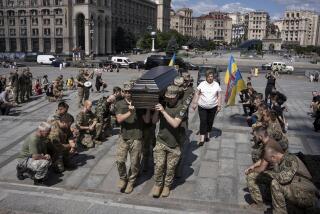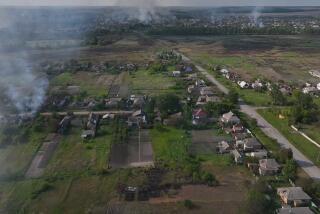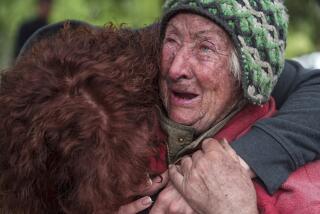Chechens Stream Out of Republic’s Capital : Caucasus: ‘Everyone is scared. Everyone is leaving,’ a resident says. Russians press attack on the city’s south.
- Share via
GROZNY, Russia — Vakhit Dachayev said goodby to Grozny from the sidecar of a muddy green motorcycle Monday, joining a flow of refugees from the Russian army’s growing air and artillery attacks on the southern perimeter of this rebel capital.
“Everyone is scared. Everyone is leaving,” said the former tractor driver, whose occupation for the five weeks of this war has been defending his apartment in Grozny’s high-rent district. “The shelling is so intense you cannot sleep, and you can never tell where it’s coming from. This is becoming like hell.”
At least 400,000 other people in the tiny Muslim republic of Chechnya had reached the same conclusion and left their homes before the Russian forces last week began the latest push from north of Grozny toward the downtown palace of President Dzhokar M. Dudayev, leader of the Chechens’ self-declared independence.
Now a new exodus is under way as the Russians try to encircle the center by linking up in the city’s south. Hundreds of people were on the move Monday in southern Grozny--some hauling away their most valued possessions, some leaving indefinitely. Many flew white flags from their vehicles.
The conflict, which has claimed untold thousands of lives and thrown the Kremlin into its worst crisis since the end of communism, appeared to be stalemated at its vortex--the presidential palace, surrounding government buildings and a nearby railway station.
Reporters who braved their way toward the center said the Russians, despite overwhelming firepower, seemed bogged down. Chechen fighters said their forces were holding the palace and had recaptured the Cabinet building and parts of the rail station. Small-arms fire echoed with greater-than-ever intensity amid the shelling.
With a long way yet to go before the city is conquered, Russian Prime Minister Viktor S. Chernomyrdin in Moscow on Monday proposed urgent new peace talks accompanied by a broad cease-fire in Chechnya. “Our main task today is to end the bloodshed,” he said in a nationally televised address.
But a similar attempt at a 48-hour truce broke down right away last week, and the Chechen leadership had yet to respond to this latest offer.
Also on Monday, U.S. officials said Washington and Moscow were negotiating a possible May summit between Russian President Boris N. Yeltsin and President Clinton. Yeltsin invited Clinton to come to Moscow in May to commemorate the 50th anniversary of the Allied victory in World War II and to discuss the usual range of diplomatic and economic issues.
U.S. officials, however, are reluctant to agree to a summit while the assault on Chechnya continues. One senior Administration official said Clinton does not want to “reward” Yeltsin for military action he considers unwise and unnecessarily brutal.
“There will be a conversation about that between (Secretary of State Warren) Christopher and (Foreign Minister Andrei V.) Kozyrev in Geneva,” White House Press Secretary Mike McCurry told reporters in Washington on Monday.
Christopher was leaving later Monday for Geneva for talks starting tonight with Kozyrev.
Meanwhile in Grozny, from a ridge overlooking the city from the south, Dudayev’s nine-story palace looked like a small, rust-colored box in the middle of a vast waste dump as gray as the overcast sky. With the distant thud of artillery fire, a whitish plume of smoke rose from its north face.
By a road winding up toward the ridge, dozens of people deprived by war of the water in their taps gathered at a well with huge containers of plastic and tin. An old man in a conical lambskin hat pointed to his rural neighborhood just up another hill and said Russian warplanes had bombed it Sunday, wounding a shepherd.
The jets returned Monday, circling low over the vicinity of the well. The bucket crowd thinned out.
“Both sides should have laid down their arms long ago,” said Adlan Sanmarzayev, a 62-year-old locomotive driver, who passed by the well in a truck laden with the contents of his southern Grozny apartment, destroyed late last week by five rockets. “This is crazy.”
A tour of southern Grozny offered an eerie contrast with the center, where bodies of war dead lie rotting and entire blocks have been blackened or razed by weeks of battle. Most buildings in the south are intact and inhabited, and automobile traffic moves relatively freely.
At an outdoor market three miles south of the presidential palace, traders did brisk business in chocolates, baby food, rice, cigarettes, soft drinks and canned milk, while explosions thundered not far away.
The Russians appear intent on bombing and shelling southern Grozny to flush out as many Chechen civilians and fighters as possible before sending troops to complete their encirclement. Truck convoys of fresh Russian marines were reported moving toward the city from the east.
Bombs and rockets began raining late last week near the Minutka traffic circle, a major crossroads 2 1/2 miles south of the presidential palace, and on villages to the south and southeast of Grozny.
New air raids Monday hit the southern villages of Staraya Atagi, near the capital’s only functioning hospital, and Achikhoi-Martan, according to international relief workers. Television footage showed a major artillery attack on the southern village of Bamud.
The new pattern of attack uprooted some refugees for a second time, Chechen officials said.
“When the mass bombing of Grozny started last month, people headed for the south,” said Vakhit Gelayev, head of the civil defense agency in Gikalo, a farm community on the edge of Grozny that was first bombed Friday. “Now the south is being hit, they’re on the run again. Some are fleeing back to the city.”
The International Committee of the Red Cross reported Monday that 150,000 people have fled Chechnya since the Dec. 11 Russian invasion and that 250,000 others have been displaced within the mountainous republic.
Counting is difficult, it added, because so many fighters go back and forth from Grozny to distant villages.
Among such fighters was the seven-man clan led by Magomed Yusupov, a 56-year-old Chechen too nearsighted for combat. He was riding shotgun south out of Grozny with his fighting-age brethren in a high-walled pickup truck packed with three orange couches, three easy chairs, a dining room table, a pile of hand-woven carpets and a chained mongrel.
“We’re just taking this stuff out so it won’t burn up in Grozny,” Yusupov said. “We’ll be back to defend our home. It’s not a true Chechen who flees when a war is being fought for his motherland.”
Others on the southern highway were retreating for real.
Dachayev, the man in the sidecar, was sharing that space with his television set, stereo and other valuables from his apartment near the Minutka traffic circle. His companion, Ruslan Tolgayev, drove the motorcycle toward Urus Martan, a southern suburb considered anti-Dudayev enough to be safe from Russian attack.
Stopping for reporters, Dachayev gestured with a wounded right hand wrapped in a red sock. With his left, he pulled six pieces of shrapnel from a pocket of his black overcoat to explain his decision to flee: Two mysterious cars pulled up to his apartment house Sunday night and fired trench mortars, sending shrapnel through his windows.
“If you go out and fight, it’s dangerous,” he said. “If you sit home, it’s dangerous. But so many people have nowhere to go. They don’t know what to do.”
Times staff writers Carey Goldberg in Moscow and John M. Broder in Washington contributed to this report.
More to Read
Sign up for Essential California
The most important California stories and recommendations in your inbox every morning.
You may occasionally receive promotional content from the Los Angeles Times.











